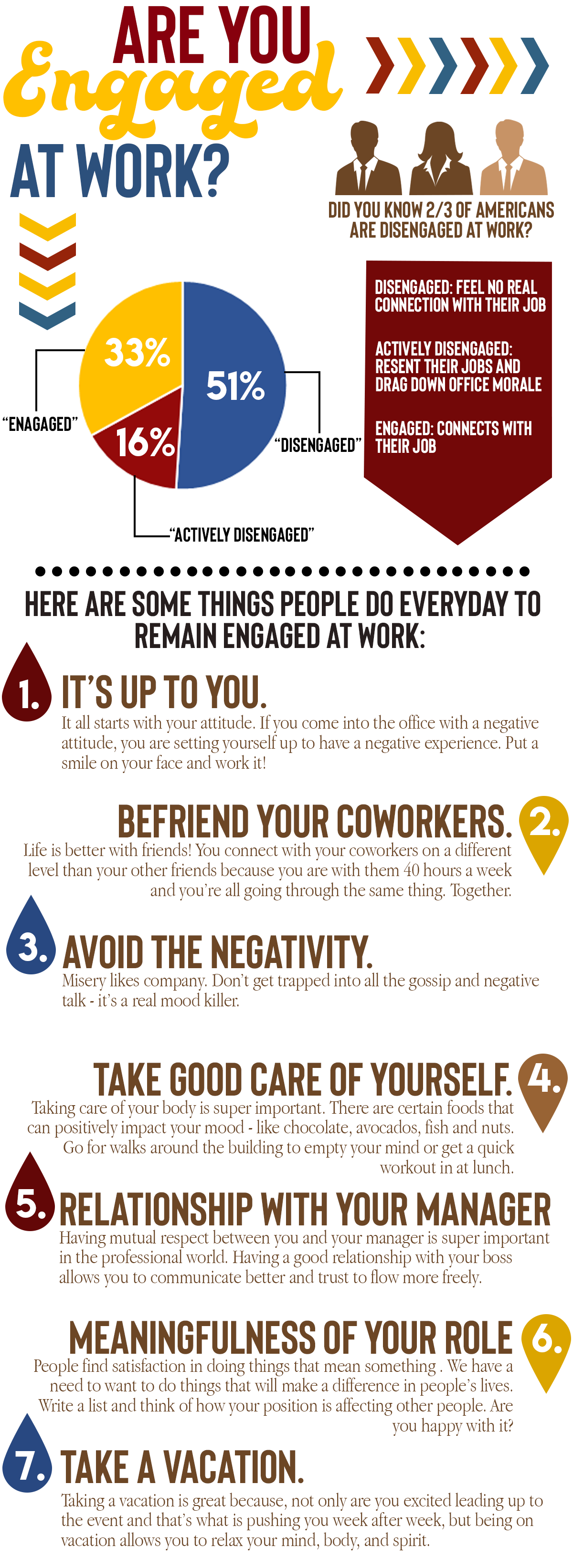This info graphic explains some great ways you can ensure you are remaining engaged at work. With 2/3 of the American working population disengaged we couldn’t help but share some tips!

This info graphic explains some great ways you can ensure you are remaining engaged at work. With 2/3 of the American working population disengaged we couldn’t help but share some tips!

You just started your first day at your new job! Congrats! How was it? Did you make lots of friends? What are the people like? Are they friendly or serious? Outgoing or shy? Sorry, I probably sound like your mother, but making new friends at a new company is serious business and it can be tough, especially if you’re a little shy! A simple “Hi, how are you doing?” could start the beginning of a life-long friend. Also, according to a study, making friends at work not only brings you happiness, but it makes you very successful in your career. You are seven times more likely to be engaged in your job when you have friends around the office. So, how do you do it? How do you make friends in a professional setting? There are many factors that come into play with making and maintaining work amigos and there are some serious ground rules to follow:
Remember: they’re your work friends not your social friends. Different rules apply between these two friend groups. By following these easy Do’s and Don’ts, you ought to make some great work friends and, just like you, they do have their own personal life. So, keep it practical, professional, and genuine.
Take a look around your office. How many people are millennials? How many are living up to the millennial stereotype that people go on and on about?
In just a few years, the majority of the workforce will be millennials. Some say millennials are going to doom us all. Some say they’re going to kill the economy. The common stereotypes include being stubborn, spoiled brats that don’t work hard, are lazy, and are obsessed with their smart phones. However, I’ll tell you why they’re going to revitalize the workplace.
Slowly but surely, millennials are already making an impact by changing everyday work life. Generally, it’s hard to have a work-life balance, especially in the healthcare industry. A lot of healthcare professional work jobs that require them to work long hours, but this is changing thanks to millennials. One of the most important thing to millennials, is a work-life balance. William Hartenbach, M.D., executive vice president of anesthesia services for physician staffing firm EmCare, let his employees have more PTO and vacation time because “it’s increasingly important to make sure that you don’t get burned out. It’s a long career and it’s fairly intense and the stakes are high.”
Managers are also allowing employees to have more flexible schedules and are able to create their own hours. Not everyone is working the same 8-5 time. Also, thanks to technology and the way millennials understand it, some companies give the option to work from home. Having flexible hours and working from home means you have time to be with your kids when they get back from school and for some even allows them time to make breakfast with them before heading off to work. In 1975, the average time mothers and fathers spent with their kids were 9.7 hours a week. In 2018, that time has doubled to 20.7 hours. Could this be because parents get to create their own schedules? Absolutely. And spending more time with your kids creates less emotional and mental problems when they get older. (Thank you, millennials.)
Millennials like to build relationships. They’re friendly people, need emotional attachment, and want to personally connect with everyone around them, including their bosses and managers. They’re more open to their personal lives and connect with people better this way. This allows for a more comfortable atmosphere and it causes work to be bearable for everyone involved. Happy employees equal a happy company.
Given a choice between working by yourself and working in a team, millennials choose working with a team 90% of the time. Teamwork makes the dream work. They also like to receive feedback and constructive criticism, that way they know what they’re doing wrong and what to do to make things better. Millennials received participation trophies and “A for Effort” so they are used to receiving something for the duties they fulfill. (Also, counterpoint, they are blamed for receiving participation trophies, but they are not the ones responsible for giving them out in the first place, now are they?) Along with constructive criticism, they like to be mentored, given advice to, and they genuinely want to know how to succeed. Millennials make determined and energetic employees, so they can outshine others. The more determined your employees are to exceed, the more successful your company.
In healthcare, treatment plans change so much because technology and research are evolving each day. Cures are created, robots are managing surgery, and patient histories are maintained through smartphone apps. Millennials are the generation that grew up on technology. It’s their baby. Where technology is a millennial generation strength, other generations consider it their weakness. Thanks to millennials the transition to this technological world has been quite simple.
Some hiring managers may get put off at the thought of hiring a millenial because of common conceptions of them being high maintenance and picky. However these millenials will be what takes your business to the next level. Learning what it is important too them is the first step in a successful partnership. Painting a clear picture of the position and expectations along with flexible hours, relationships, teamwork and technology are what matter most.
Whether you’re a manager with limited time (patience) and need help finding the right millenial or a millenial on the job hunt, you can count on HealthCare Support to be upfront and address any concerns head on.